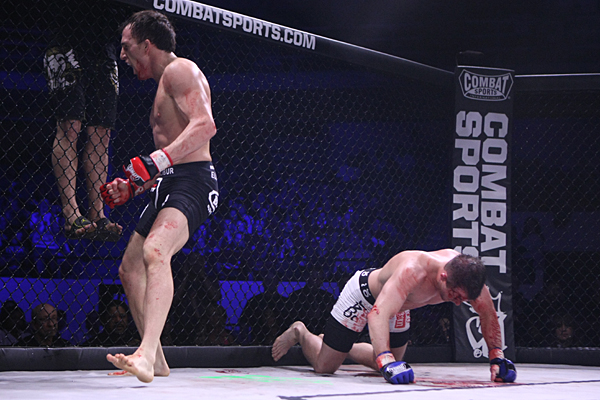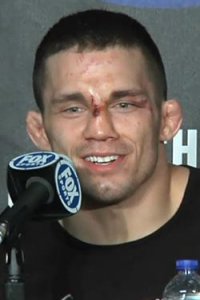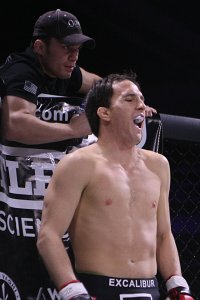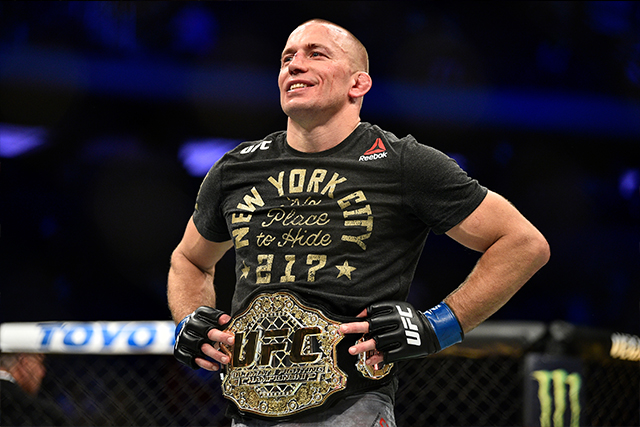Thicker Than Water
An Improbable Return
Joseph Santoliquito Apr 27, 2012

As Joe waded through the early portion of his career, struggling to find the balance between collegiate wrestling and his side MMA gig, Jake began exploring how to immerse himself more into what was turning into a passion.
“When Jake got back from the Marines, we got closer,” Joe said. “Jake had a better understanding of how my mind worked, and I liked how he got up to speed with how my mind operated. When we were younger, I didn’t think about it too much. Jake did his thing; I did my thing. We were two separate people, I guess. Looking back, maybe I wanted more for him.”
Advertisement
“I worked with him, but you could tell Jake had natural talent,” Joe said. “For Jake, my theme was: ‘You don’t learn wrestling for the sake of wrestling.’ It’s a life lesson. It’s what I like about wrestling. It’s not just technique and beating someone else. It’s about finding yourself in this battle. A lot of guys who never experienced that become a better person for it. Jake learned not to back down and quit when the fire got hot. Who is going to bend and not break? That’s where Jake found his niche. He knows he’s not going to quit, but having me tell him that is big for him.”

Dave
Mandel
Jake Ellenberger has won six
straight bouts in the UFC.
“We took a beating and Jake mopped this kid up,” Joe said. “We were in this kid’s backyard and the third round begins. I was thinking we had to finish this guy. Jake got the guy on his back and choked him out. It was the first time Jake was in that kind of adversity, and he came back. It was the culmination of everything in his life to that point.”
Joe launched his professional MMA career, too. He started 10-0 and had it all mapped out. The Ellenberger Brothers would rule the MMA world like they ruled their basement matches. That is when PNH fogged the picture.
They met in the Nebraska Kearney student weight room. She was on one the machines and he had no problem coming up and talking her ear off. It was one thing Joe’s wife, Vanessa, noticed about him. He is not shy. That was how they met. He told her he was an MMA fighter and showed her some YouTube videos of himself. At first, she thought it was scary, though came to understand and enjoy it.
Through time, they got to know each other more, and, in May 2010, they were married. Vanessa was with Joe through the winding journey that led to PNH.
“Joe can be pretty stubborn, so getting him to go to the doctor was even hard from the beginning,” she said. “I knew something wasn’t right when he was sleeping abnormal amounts of hours, complaining of abdominal pain and back pain. I was also a nursing student at the time, now a registered nurse, so, of course, I was trying to diagnose him. We thought he might have the mononucleosis virus. Never did we think this would be something that would affect him for the rest of his life.”
It took months to figure out everything, Vanessa said. She will never forget the day Joe found out. After another battery of tests was completed, Joe’s hematologist called with the diagnosis. The nurse suggested Joe come in to hear in person.
“Joe [almost happily] tells me that they finally had a diagnosis of PNH,” Vanessa said. “He was on his way to wrestling practice, while I was sitting at my apartment in front of my computer. So, naturally, I googled PNH, and the results were shocking. The one thing that stuck out in my mind was a 10-year survival rate after diagnosis. Crying, I called Joe back and read to him what the Internet said about PNH. He assured me he was going to be fine and he would talk to me after practice.”
That was how Joe was going to handle it. He would put up a strong veneer. He had to. Vanessa had fears of losing the love of her life. When she got worked up and emotional, Joe was there with a comforting hug and a whisper: “I am invincible V.” They made a pact that the disease was not going to destroy their lives, that each second, each minute with one another would be a blessing. Secretly, Joe battled the dark times. He would steal away and cry, always putting up the Superman front each time he dealt with his family, especially Jake. Joe wanted to be the rock on which everyone could lean. There were some nights Joe would fire off texts to his brothers, apologizing for putting them through this.
“Some people, in general, around me expected me to be the guy who sulked and was needy of other people’s attention and comfort, taking everyone else’s charity; that’s not me,” Joe said emphatically. “Not being that guy also comforted me and everyone close to me: ‘He’s Joe. He’s Joe Ellenberger. This isn’t going to beat him.’ So we started looking for a way to combat this.”

Keith
Mills
Improbably, the Ellenberger twins
fight on, side by side.
For one, the drug cost $409,000 a year. Secondly, Joe would have to get the drug fed into his body intravenously every 14 days.
“I had known about the drug before I met Dr. Bessler, but the cost made it impossible; I’m not Warren Buffet,” Joe said. “I ruled it out. I wasn’t thinking about the drug. My family couldn’t afford it. So when the doctor brought it up, she assured us other families made it work. That’s when I looked further into it, and, sure enough, 80 percent of it was picked up by my insurance and [the National Organization for Rare Disorders].
“That left 20 percent still costing $80,000 a year, but I started taking the drug in March 2010 and I can honestly say I feel fine,” he added. “Once I got on the drug, I didn’t feel any different. I didn’t feel as tired. Six months later, I was able to filter off the blood thinners, which made my mother and family much happier.”
Now it was time to make himself happier. He thought about fighting again. He returned to his routine. He made sure openly that he remained upbeat and convinced everyone to keep it moving. Off the blood thinners, Joe received a reluctant OK from doctors that he could start working out again. It was Jake that stirred the fire. Jake just finished beating Mike Pyle in January 2010, and he was preparing for John Howard next at UFC Live 2. Joe would work him, sore and happy.
“That’s what started it, that’s what got me thinking about coming back,” Joe said. “It opened my eyes and gave me a new perspective, how I took everything for granted that I did. After Jake beat Howard, B.J. Penn called Jake and me to go to Hawaii and do some work with him for a few weeks. The first three months back after taking the medication, I wasn’t only training again, but training with some of the best in the world. That’s what convinced me.”
Two years later, two years after battling something not many had ever heard of, something that threatened to end his life, Joe was back in the cage again. He was a little blown up, 170 pounds, when he took on and beat Jeff Carstens at Disorderly Conduct “The Return” in May. Still, the most important part of it was the fact that Joe had indeed returned. He is 3-1 since coming back, armed with a far greater gift than winning any title.
Jake has to remove the emotion chip when it comes to talking about Joe. It is not an easy process. Where one time Joe wanted so many things for Jake, the roles have reversed. Jake has experienced a kaleidoscope of emotions. He feeds off Joe’s energy and bursting inner strength.
“Joe is absolutely the most amazing person I know, with everything he’s been through,” Jake said. “I see what Joe has done and everything I’ve accomplished, and I can’t even compete with what Joe has done. It was hard to deal with, seeing him some days. I would have traded places with him in a heartbeat. I wished it was me, but, at the same time, I decided that I wanted to start killing people. I started to feel even more strongly I was fighting for the both of us. Joe’s been in my corner since day one. That wasn’t going to change, and that will never change.”
Joe lives by the mantra of the late Jim Valvano, the former North Carolina State University men’s basketball coach who succumbed to cancer in 1993 at the age of 47: “Don’t give up, don’t ever give up.”
“
and everything I’ve
accomplished, and I can’t
even compete with
what Joe has done.
”
“As far as what Joe endures on a daily basis, I think he lives a fairly normal life,” she added. “He is very blessed to have stayed so healthy thus far. No one really believes PNH is a very serious condition, because Joe appears to be in very good health. Joe always says, ‘Put your faith in God, light a fire in your heart and never ever, ever give up.’ That is how Joe lives each day of his life.”
Joe still wages his daily battle against this rare disease. He has far more good days than bad, and he would like to stay down at 155 pounds, if possible. Above all else, it has been about getting back, competing and feeling whole once again.
“I can honestly say that I’m not in this right now for the money or fame; I’m in this because I’m doing what I love to do,” Joe said. “I don’t want anyone feeling sorry for me. It bothers me very much when someone does. I’ve gained perspective. I realize how deeply people care about my well-being. Jake would quit today if it meant saving me in any way. I like to say I’ve been on both sides and realize how important this is in my life. Since the time this happened, I always say that, with my luck, I’ll live to 150 years old.”
Related Articles







